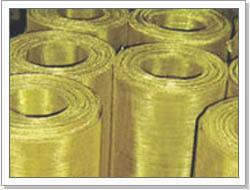
Commercial Bronze: Has a high percent of copper. Normally used in a corrosion application where brass is not suitable.
Phosphorus Bronze: Due to its physical properties this alloy is ideal for weaving. It has a wide range of applications including filtration, to screening. This alloy is stronger than brass and can withstand a great deal of cold working.
Brass: This is a non-rusting material and is used in some industrial and architectural applications.
PHOSPHORUS BRONZE
Copper: This alloy is known for its ability to conduct electricity. Used in applications where electrical properties are needed.
Phosphorus Bronze: Due to its physical properties this alloy is ideal for weaving. It has a wide range of applications including filtration, to screening. This alloy is stronger than brass and can withstand a great deal of cold working.
Brass: This is a non-rusting material and is used in some industrial and architectural applications.
PHOSPHORUS BRONZE
Copper: This alloy is known for its ability to conduct electricity. Used in applications where electrical properties are needed.
Features
- Commercial Bronze
- Has a high percent of copper. Normally used in a corrosion application where brass is not suitable
- Phosphorus Bronze
- Due to its physical properties this alloy is ideal for weaving. It has a wide range of applications including filtration, to screening. This alloy is stronger than brass and can withstand a great deal of cold working.
- Brass
- This is a non-rusting material and is used in some industrial and architectural applications
- Copper
- This alloy is known for its ability to conduct electricity. Used in applications where electrical properties are needed.
Main Products
Crimped mesh Conveyer belt Stainless steel wire mesh Fencing
